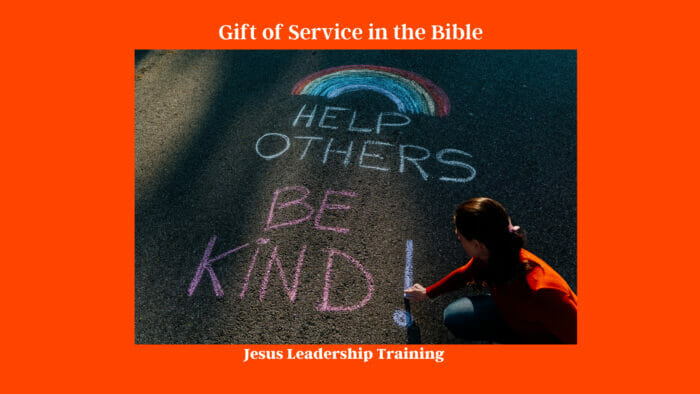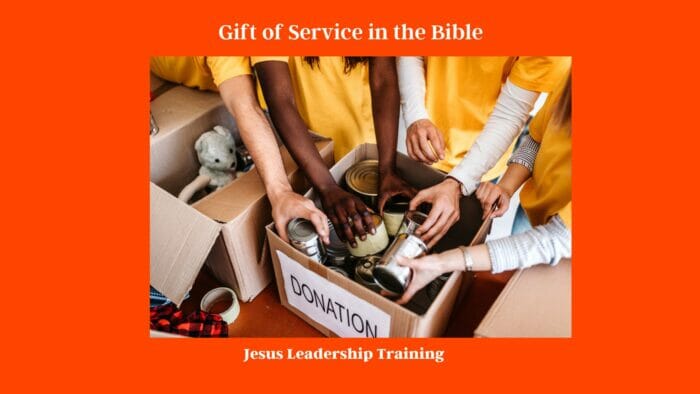Discover how the remarkable gift of service in the Bible continues to shape Christian lives and communities today. Explore the origins, the deep-rooted biblical traditions, and the transformative power that service holds in the Bible.
Table of Contents
Gift of Service in the Bible (Serve)
Have you ever contemplated what makes service such an integral part of the Christian faith? When we delve into the Scriptures, we can find numerous instances where individuals were called to serve, often altering the course of their lives and those around them.
Understanding the Concept of Service in Biblical Terms
In the Bible, service is more than just an action. It is a manifestation of faith, a means to express love, and a path to become more Christ-like. Whether it’s serving God, serving one’s neighbors, or serving one’s community, the act of service is a transformative experience. It represents selflessness, devotion, and a commitment to a cause greater than oneself.
The Role of Service in Christian Life
The act of service is deeply rooted in the Christian lifestyle. It is the heartbeat of our faith. The Bible instructs, “As each has received a gift, use it to serve one another, as good stewards of God’s varied grace” (1 Peter 4:10). Thus, service is not just an expectation, but a joyful duty that believers are entrusted with.
What are the 7 Spiritual Gifts in the Bible: Spirit | Scripture | Biblical

People in the New Testament with the Spiritual Gifts of Service
| New Testament Individual | Example of Service | Biblical Reference |
|---|---|---|
| Tabitha (also known as Dorcas) | She was always doing good and helping the poor by making robes and other clothing. | Acts 9:36-39 |
| Phoebe | Described as a servant of the church at Cenchreae, she was a helper of many, including Paul himself. | Romans 16:1-2 |
| Stephen | He was one of the seven men full of faith and the Holy Spirit who were appointed to distribute food and aid to the widows of the Greek-speaking believers. | Acts 6:1-5 |
| Priscilla and Aquila | This couple provided hospitality to Paul, and were instrumental in teaching and serving the early church. | Acts 18:1-4; 26, Romans 16:3-4 |
| Onesiphorus | He often refreshed Paul, was not ashamed of Paul’s chains and when he arrived in Rome, he searched hard for Paul until he found him. | 2 Timothy 1:16-18 |
| Timothy | Timothy served Paul like a son serving his father, caring for the needs of the church in Philippi. | Philippians 2:19-22 |
| Martha | She showed her service by offering hospitality to Jesus and his disciples. | Luke 10:38-42 |
| The Good Samaritan | Though not named, this man serves as a parable example of service by providing for the needs of a robbed and beaten man he found on the road. | Luke 10:25-37 |
These examples show individuals who went beyond their everyday duties to care for the needs of others, serving as key illustrations of the spiritual gift of service in the New Testament.
This introduction begins to lay the groundwork for our exploration of the gift of service in the Bible. By diving deep into this topic, we hope to provide a comprehensive understanding of this biblical principle, its historical examples, and how it can be applied in our modern lives. Stay tuned as we journey through the Scriptures, examining service in the Old and New Testaments, investigating the lives of significant biblical figures who exemplified service, and exploring the contemporary applications of this godly gift.

The Essence of the Gift of Service
The gift of service is not a random act of kindness that we bestow upon others on a whim. It’s a lifestyle, a commitment, and, most importantly, a divine calling. This section explores the essence of the gift of service, highlighting its importance and relevance to the faith and life of a Christian.
The Biblical Definition of Service ( Spiritual Gifts)
What is service in biblical terms? It is an act of humility, love, and selflessness that reflects our devotion to God and our fellow human beings. The Bible clearly states, “Whoever wants to become great among you must be your servant” (Mark 10:43). Thus, service, in its essence, means placing the needs of others before your own. It’s about understanding and empathizing with the suffering of others and doing our best to alleviate it.
Difference between Ministry Gifts and Spiritual Gifts
Ministry gifts and spiritual gifts are two distinct but overlapping concepts in Christian theology. Here’s a table outlining some of their main differences:
| Aspect | Ministry Gifts | Spiritual Gifts |
|---|---|---|
| Definition | Ministry gifts, according to Ephesians 4:11-13, are roles that Christ has given to the church for the purpose of equipping the saints for the work of ministry, for building up the body of Christ. They include apostles, prophets, evangelists, pastors, and teachers. | Spiritual gifts, according to 1 Corinthians 12, Romans 12, and Ephesians 4, are supernatural endowments given by the Holy Spirit to every believer for the common good and edification of the church. They include gifts such as prophecy, service, teaching, exhortation, giving, leadership, and mercy, among others. |
| Purpose | The purpose of ministry gifts is primarily equipping and building up the church body in knowledge and faith. They help guide, nurture, and develop believers in their faith journey and service. | The purpose of spiritual gifts is to enable believers to serve one another and the church body in diverse ways, edifying the church, and manifesting the power and presence of the Holy Spirit. |
| Dispensation | Ministry gifts are specific roles or positions given to specific individuals for the leadership and edification of the church. | Spiritual gifts can be given to any believer, irrespective of their role or position in the church. |
| Variety | There is a specific list of ministry gifts mentioned in Ephesians 4:11-13, although different Christian traditions may have different interpretations and expansions on this list. | The Bible mentions a variety of spiritual gifts in different passages, and many believe that this is not an exhaustive list but represents the diverse ways the Holy Spirit can work through believers. |
| Utilization | Ministry gifts are typically used in the context of church leadership, preaching, teaching, and other forms of public ministry. | Spiritual gifts can be used in a wide range of contexts, both within and outside the church. They can be used in one-on-one interactions, small group settings, large gatherings, and even in the believer’s secular life. |

How the Gift of Service Transforms Individuals and Communities (Servers)
The gift of service has a transformative power that extends beyond the individual to the community at large. When we serve, we don’t just change the lives of those we help, but we also change ourselves. It molds us into more compassionate, patient, and understanding individuals. On a broader scale, it creates a sense of unity and empathy within communities, encouraging a culture of mutual support and cooperation.
Gift of Service in the Old Testament
The Old Testament is replete with instances where individuals were called to serve, often shaping the course of history in the process. Let’s explore how service was portrayed in the lives of biblical patriarchs and prophets.
Service in the Lives of Biblical Patriarchs
The patriarchs of the Old Testament, including Abraham, Isaac, and Jacob, were exceptional examples of service. They not only served God with steadfast faith and unwavering dedication, but they also served their communities, promoting justice, peace, and righteousness. Abraham’s hospitality to strangers, Isaac’s patience in the face of adversity, and Jacob’s perseverance all demonstrate their spirit of service.
The Prophets and the Gift of Service
The prophets, too, served in various capacities, often at great personal cost. They stood as intermediaries between God and the people, delivering messages of repentance, hope, and restoration. They served their communities by being voices for the voiceless and advocating for justice.
This exploration of the Old Testament offers an insight into how the gift of service shaped the lives of those in biblical times. The lessons learned from their acts of service continue to inspire and guide us in our service today.
Gift of Service in the New Testament (Diakonia)
As we transition from the Old Testament into the New, the concept of service takes on a renewed significance. From the life of Jesus Christ to the acts of the Apostles, service is the hallmark of their ministries and teachings.
Steps to acquire the Holy Spirits Gift of Service
| Steps | Description |
|---|---|
| 1. Acceptance of Christ | This is the first step towards receiving any spiritual gift. Through faith in Jesus Christ, an individual receives the Holy Spirit. |
| 2. Pray for the Gift | As with any spiritual gift, ask God to bless you with the gift of service. Express your desire to serve others and glorify God in your actions. |
| 3. Understand the Gift | Spend time understanding what the gift of service entails. Study the scriptures, research, and learn from the examples of those who have been blessed with this gift. |
| 4. Practice Serving | Look for opportunities to serve within your church, community, or other organizations. This will give you practical experience and allow you to discern if this is indeed your spiritual gift. |
| 5. Spiritual Discernment | With prayer and practice, seek to discern if the gift of service is something that God has indeed equipped you with. This can often be confirmed through the recognition and affirmation of others in your faith community. |
| 6. Regular Prayer and Meditation | Continually pray for God’s guidance, wisdom, and strength in exercising your spiritual gifts. This helps to keep your motivation pure and service-focused. |
| 7. Be Open to the Holy Spirit | Be sensitive and open to the guidance of the Holy Spirit. He will often direct you to areas of need and guide you in your service. |
| 8. Continuous Learning | Continue to learn and grow in your gift. This might include attending workshops, receiving mentorship, and participating in Bible studies related to the gift of service. |
| 9. Perseverance | Persevere in service, even when challenges arise. Your perseverance, undergirded by love, is a testament to the strength and sincerity of your gift. |
| 10. Glorify God | Ultimately, all spiritual gifts are given for the edification of the church and the glory of God. So, use your gift of service to glorify God and spread His love. |
These steps should guide anyone seeking to develop their spiritual gift of service. However, remember that every spiritual journey is unique, and these steps may manifest differently in different people.
Jesus Christ: The Ultimate Example of Service (Greek)
No discussion on the gift of service in the Bible would be complete without referencing the ultimate servant – Jesus Christ. His life was an embodiment of service, as he stated, “For even the Son of Man did not come to be served, but to serve, and to give his life as a ransom for many” (Mark 10:45). Christ’s acts of healing the sick, feeding the hungry, and ultimately sacrificing His life on the cross set the perfect example of service for all humanity.
Apostles and the Acts of Service
Following Christ’s example, the Apostles carried on the legacy of service. They preached the gospel, healed the sick, and aided the needy. They dedicated their lives to serving God and their communities, often facing persecution and hardship in the process. Their unwavering commitment to service laid the foundation for the early church and continues to guide modern Christian practices.
Biblical Characters Who Exhibited the Gift of Service
Apart from the key figures, several other biblical characters exhibited the gift of service in their lives. Their stories offer valuable lessons on service and dedication.
The Faithfulness of Ruth
Ruth, a Moabite woman, showcased a unique form of service. Her loyalty and dedication to her mother-in-law, Naomi, provide a vivid example of service within a family setting. Despite facing immense hardships, Ruth chose to stand by Naomi, demonstrating the power of service to strengthen relationships and change lives.
The Dedication of Martha
Martha, a friend of Jesus, is another character who demonstrated the gift of service. While she is often contrasted with her sister Mary, Martha’s dedication to serving Jesus and his disciples embodies a deep-seated love and respect for Christ. She teaches us that service, when carried out with a pure heart, is a form of worship that pleases God.
These characters and their stories instill in us a renewed appreciation for the gift of service, reminding us of the profound impact that even the simplest acts of service can h
New Testament Examples of the Holy Spirits Gift of Service
Absolutely, let’s examine some New Testament examples of individuals exercising the Holy Spirit’s gift of service:
| Individual | Scripture Reference | Example of Service |
|---|---|---|
| The Good Samaritan | Luke 10:30-37 | The Good Samaritan goes out of his way to help an injured man on the road. He not only bandages his wounds, but also pays for his care at an inn, showing selfless service towards a stranger. |
| Tabitha (Dorcas) | Acts 9:36-42 | Tabitha was known for her good works and acts of charity. She made clothing for the poor, serving her community with her skills and resources. When she died, the community mourned deeply, indicating her substantial impact. |
| Stephen | Acts 6:1-7 | Stephen, along with six others, were appointed to oversee the daily distribution to widows, ensuring fairness. He was later stoned to death for his faith, showing his dedication to service even in the face of danger. |
| Phoebe | Romans 16:1-2 | Phoebe is described by Paul as a “servant of the church” and someone who has been a “helper of many”. These words suggest that she was actively engaged in serving her Christian community. |
| Mary, Martha’s sister | John 12:1-8 | Mary served Jesus by anointing His feet with expensive perfume. This act, though criticized by Judas as wasteful, was seen by Jesus as a profound act of service and worship. |
| Priscilla and Aquila | Acts 18:24-26 | This husband and wife team took Apollos aside and explained the way of God to him more accurately. They used their knowledge to serve the growth of the Church. |
| The Believers in the Early Church | Acts 2:44-47 | The believers were together and had everything in common. They sold property and possessions to give to anyone who had need. This reflects their commitment to serving one another and their community. |
Roles of Service in the Church Today
In the modern church, the principle of service remains as relevant as it was in biblical times. Churches across the globe continue to uphold the value of service as a core element of Christian life.
Holy Spirit’s gift of service can manifest in different ways, even as every Christian is called to serve
Indeed, the Holy Spirit’s gift of service can manifest in different ways, even as every Christian is called to serve. Let’s look at some distinctions:
| Aspect | Holy Spirit’s Gift of Service | Normal Christian Service |
|---|---|---|
| Motivation | This form of service is often motivated by a divine call. Individuals with the gift of service feel a strong inner compulsion to help and serve others, often feeling joy and fulfillment in doing so. | The motivation can be varied – love for others, obedience to Christ’s commands, a desire to do good works, or responsibility towards the church community. |
| Ability | The Holy Spirit empowers those with the gift of service to serve in ways that go beyond their natural abilities. They may find themselves capable of extraordinary acts of service that they wouldn’t be able to do otherwise. | Normal Christian service utilizes the believer’s existing skills and abilities. While they can still do good work, they may not experience the same level of divine empowerment. |
| Scope | The gift of service can lead individuals to serve in large-scale, impactful ways that affect many people, even beyond their local community. This could range from leadership roles in church to establishing charitable organizations. | Normal Christian service is often more localized, focusing on the individual’s immediate community – their church, neighborhood, family, or friends. |
| Impact | Those with the gift of service can have a profound impact, often inspiring others and bringing about significant positive change. Their service can often lead to deep spiritual transformation in those they serve. | While the impact of normal Christian service is still important, it may not have the same broad or deep influence. The impact is often more subtle, strengthening the bonds within the community and promoting harmony. |
| Recognition | Those with the gift of service are often recognized in their community for their service. This is not for personal glory, but as a testimony to the work of the Holy Spirit in and through them. | Normal Christian service may not always be recognized or acknowledged widely. Many acts of service are done quietly and without fanfare, yet they still contribute to the health and vitality of the community. |
How Modern Church Interprets Biblical Service
The modern church interprets biblical service as active participation in the church and community to meet physical, emotional, and spiritual needs. It views service as an avenue to put faith into action, aligning with the biblical call to love and serve one another.
Whether it’s volunteering for church activities, participating in mission trips, or helping in community outreach programs, service is encouraged in various forms. It serves as a testament to the church’s commitment to the teachings of Christ and their dedication to serving God and humanity.
Encouraging the Gift of Service in Today’s Christianity
Churches today are making significant strides in fostering a culture of service among their congregations. They strive to instill the concept of servant leadership and encourage believers to utilize their spiritual gifts for the benefit of the community.
Sermons, Bible study classes, and fellowship groups often highlight biblical instances of service and discuss how they can be translated into today’s context. Many churches have programs designed to help individuals discover their spiritual gifts, enabling them to serve more effectively in their respective spheres of influence.
Practical Ways to Manifest the Gift of Service
The gift of service isn’t confined to the walls of the church or specific religious activities. It extends into every aspect of a Christian’s life. Here, we discuss some practical ways individuals can manifest the gift of service in different arenas.
Service at Home
Home is the first place where the gift of service can be manifested. It could be as simple as helping with household chores, caring for sick family members, or offering emotional support to a struggling sibling. Through these acts of service, we can foster a sense of love, respect, and unity within our families.
Service in the Workplace
The workplace offers numerous opportunities for service. This could be through mentoring a new colleague, volunteering for extra tasks, or creating a supportive work environment for everyone. As Christians, it’s essential to remember that our service in the workplace is a reflection of our faith and a testimony of our commitment to Christ.
Service in the Community
Community service can take on various forms, from volunteering at local shelters to participating in neighborhood cleanup drives. Through such acts, we can make a significant impact on our communities, reflecting Christ’s love and compassio
Frequently Asked Questions about the Gift of Service in the Bible
In the journey of understanding the gift of service as outlined in the Bible, numerous questions may arise. This section will aim to answer some of these commonly asked questions.
Why is the Gift of Service Important?
The gift of service is critical because it reflects the character of Christ, who came not to be served but to serve others. When we serve, we emulate Christ’s example, express our love for God, and fulfill His commandment to love our neighbors as ourselves. It enables us to become instruments of God’s grace, bringing comfort, hope, and joy to those we serve.
Is the Gift of Service a Spiritual Gift?
Yes, the gift of service is considered a spiritual gift. It’s listed in Romans 12:7 as one of the gifts given by the Holy Spirit to build up the body of Christ. Like other spiritual gifts, the gift of service is given by God and is meant to be used for His glory and the edification of others.
How Can I Develop the Gift of Service?
Developing the gift of service involves cultivating a servant’s heart, nurturing empathy, and practicing humility. It involves seeking opportunities to serve, whether in the church, home, workplace, or community. Additionally, prayer and meditation on biblical teachings on service can provide guidance and strength in our service journey.
Can Service be a Form of Worship?
Absolutely. Service can indeed be a form of worship. When we serve others selflessly, we are essentially expressing our love, reverence, and gratitude to God. As stated in Hebrews 13:16, “And do not forget to do good and to share with others, for with such sacrifices God is pleased.”
How Does Service Benefit the Servant?
While the primary purpose of service is to benefit others, the act of serving also profoundly benefits the servant. It cultivates qualities such as humility, patience, and kindness. It also brings joy and fulfillment, knowing that we’re making a difference in others’ lives. Ultimately, it brings us closer to God as we walk in obedience to His command to serve.
Final Thoughts – Gift of Service in the Bible
The gift of service in the Bible is not just an abstract concept but a practical and integral part of Christian living. It resonates throughout the scriptures, from the Old Testament patriarchs and prophets to the life and teachings of Jesus Christ and His Apostles in the New Testament. The Bible presents service as a divine calling and a manifestation of our love for God and humanity.
In the modern church and in daily life, opportunities to serve abound. Whether at home, in the workplace, or within the community, each act of service has the potential to make a profound impact. As we continue to embrace and nurture the gift of service, we’re not only transforming the lives of those we serve but also becoming more Christ-like in our walk of faith




